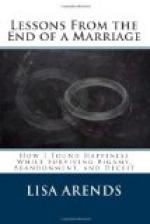This does not mean that the Law has no way of working except through the conventionalities of a people. Many times the attraction is to break away from the conventional. The stronger attraction always wins— whatever is, is best for that time and place.
“Tudor” says he “enters into the silence daily at a particular hour and enjoys the mental picture of how he desires to be when married.”
His success all depends upon the equity in that picture; upon its truth to the law of being.
An impractical idealist lives in the silence with beautiful pictures of “how he desires to be when married.” When he gets married there isn’t a single detail of his daily experience which is like his mental picture. He is sadly disappointed and perhaps embittered or discouraged.
It all depends upon the picture. If Tudor’s picture contains a benignant lord and master and a sweet little Alice Ben Bolt sort of wife who shall laugh with delight when he gives her a smile and wouldn’t hurt his feelings for a farm; who does his bidding before he bids and is always content with what he is pleased, or able, to do for her; if this is the style of Tudor’s mental picture he is certainly doomed to disappointment.
I have a suspicion that Tudor is a natural born teacher. His mental pictures may represent himself as a dispenser of moral and mental blessings. He may see Ada sitting adoringly at his feet, ever eager to learn. If so there will certainly be disappointment. East Indian girls may be more docile than American girls; East Indian men may be better and wiser lords and masters; but “Ada” is a Human Being before she is an East Indian; and a Human Being instinctively revolts from a life passed in leading strings. If Tudor continues to remind her that he is her schoolmaster she will certainly revolt; inwardly if not outwardly. Whether the revolt comes inwardly or outwardly harmony is doomed.
The first principle of happy marriage is equality. The second principle is mutual confidence, which can NEVER exist without the first.
I do not mean by “equality” what is usually meant. One member of the married twain may be rich, the other poor in worldly goods; one an aristocrat, the other plebeian; one educated, the other unschooled; and yet they may be to each other what they are in truth, equals.
Equality is a mental state, not a matter of birth or breeding, wisdom or ignorance. The TRUTH is that all men and women are equal; all are sparks of the One Life; all children of the one highly aristocratic “Father”; all heirs to the wisdom and wealth of the ages which go to make up eternity.
But all men and women are more or less unconscious, in spots at least, of this truth. They spend their lives “looking down” upon each other. Men “look down” upon their wives as “weak” or “inferior,” and women look down upon their husbands as “animals” or “great brutes.” Men are contemptuous of their wives visionariness, and women despise their husbands for “cold and calculating” tendencies.




